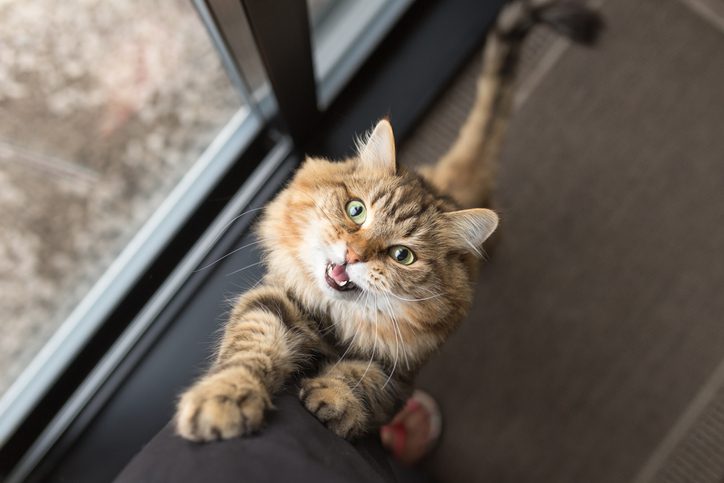Some cats can be very vocal all the time, while others are not so loud. Meowing at humans is a very different kind of communication that cats use to get attention or to alert their owners to a need for food or water. Wild cats are not nearly as vocal as house cats, but not every house cat likes to chat with its owners through loud vocalizations.
If your cat is meowing all the time, you might be wondering if they are okay. There are many reasons that your cat might be meowing that are harmless, but there are also some health conditions that can lead to excessive vocalization. If you have a cat that is being very loud, you might need to make sure that they are not suffering from a health concern.
If you want to learn more about why your cat is meowing all the time, you need to read on!

Why Do Kittens Meow?
Kittens are more vocal than adult cats because this is how they stay connected with their mother and voice their needs. They might vocalize to let their mother know they are hungry, or they might make noises to bond with their littermates as well. Kittens often vocalize when they are scared as well, and this is most common during the stage before their eyes are open.
If your kitten is talking a lot when it first moves into your home, that is not uncommon. They are trying to sort out their connection to you and their new living conditions. They might also be feeling a little lonely if they are no longer living with other cats. This is not an atypical kitten behavior, and you should only be worried if they are also pacing or if they are acting like they are in pain when they are meowing.
Why Do Older Cats Meow?
There are many common reasons that older cats might make noise during the day. Most of these are tied to seeking out attention from their owners. Cats who live with people figure out that vocalizing can alert humans to their need for food, water, or love. This is the most common reason that your cat might be vocalizing, and you should only be worried if they seem to be in distress while they are meowing.
Some older cats will also meow at their fellow cat companions to communicate displeasure, happiness, or playfulness. Cats might also get together in a group in your home and meow just to make noise together. This is not usually a sign of any kind of problem, but it can be hard on the humans that are trying to get work done or sleep. Cats that meow together in groups might just be making noise to make noise, or they might be trying to make you come to pet them or play with them.
Can Meowing be a Sign of Illness?
In some cases, cats might vocalize because they are not feeling well. Yowling can be connected with pain and cast with blockages might yowl while they are trying to go to the bathroom. Cats might also make these kinds of distressed meows when they are suffering from an injury or if they have kidney disease. Thyroid conditions can also lead to excessive vocalization because your cat might feel hungry and thirsty all the time and cannot resolve these feelings by drinking or eating.
Meowing that is accompanied by painful behavior, hiding under couches or in corners, or pacing and anxious behavior can all be signs of a more serious condition. You will want to take your cat to the vet if they are displaying any of these symptoms, along with excessive vocalization. Even anxiety in cats can lead to frequent vocalization. Your veterinarian can help you to sort out the reasons for your cat’s meowing and help you to treat the condition that is causing them to talk so much all the time.
Do Some Cat Breeds Meow More Than Others?
There are some breeds of cats that are more vocal than others. Bengal cats, as well as Siamese cats, are well-known for being excessive talkers. You will need to plan on these cats talking all the time during some days and even at night. This can be a bit hard to get used to, but as long as your Siamese or Bengal cat is not acting sick, they are probably just talking to hear their own voice.
This behavior can sometimes be alleviated by getting another cat to live with your pet and keep them company. If your cat is very vocal, especially when you first come home each day, they might just need a friend to hang out with while you are gone. This does not always alleviate excessive vocalization in certain cat breeds, but it can be worth a shot if you are tired of your cat talking all the time.
Cats Meow for Different Reasons, and Most of Them Are Not Serious
Cat meowing is often just a behavior that is used to get humans to pay attention to their needs. Certain breeds of cats will be more vocal than others, and your unique cat might just like to hear itself talking. If you have ruled out anxiety and health conditions that might be behind the meowing, you can probably assume that your cat just likes interacting with you and is trying to get you to notice them.
Make sure that your cat has enough food and water at all times and give them some love, especially when you have first come home from work. Meowing can be connected with reward behaviors, so you can also choose not to interact with your cat during times when they are making a lot of noise. Most cats will be less vocal as they age, so if you have a noisy kitten in your home, you should be patient with them. Cat vocalization is not usually a serious issue, and you might learn to love that your cat chats with you all day long.
Call 412-373-8580 to talk to your Northern Pike Veterinary Hospital team about your cat’s meowing.

